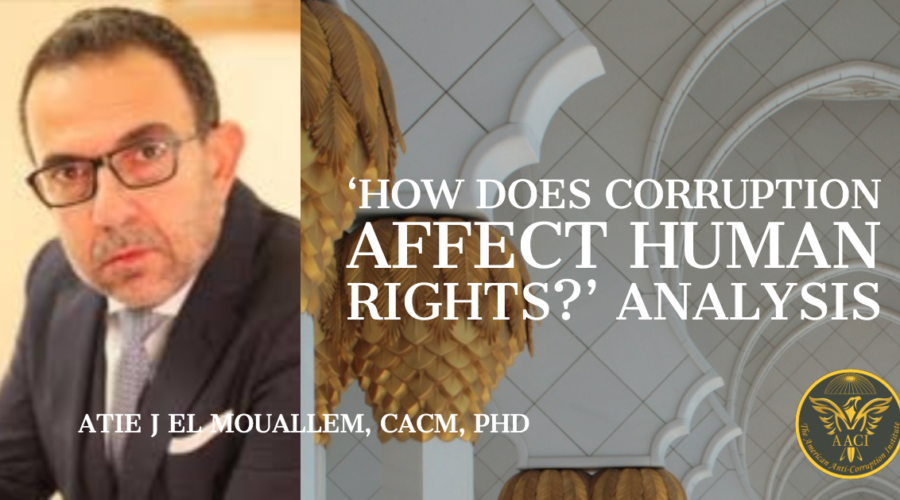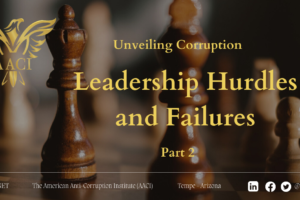Atie J El Mouallem, CACM, PhD
Financial advisor to UHNWI, private entities, family offices, and companies. Certified Anti-Corruption Manager (CACM) and member of The American Anti-Corruption Institute (AACI)
‘How does corruption affect human rights?’ is an article written by Evelyne Schmid in 2005. The author was a participant of the ASA program during which he worked with the Lebanese Transparency Association. The article provides an overview of the causes and effects of corruption along with an analysis of how corruption affects human rights. The author then applies the findings to the Lebanese case and exposes the effects of corruption on the Lebanese youth. The author opines that the relationship between human rights and corruption is a new one. It is important to remember the need to examine corruption from a different perspective too.
The relationship between corruption and human rights
Is there a human rights approach to corruption?
The author starts by examining the different definitions of corruption and the theories of corruption. The liberal theorists from 60s and 70s view corruption as a necessary evil which allows market forces to express themselves. The author then talks about a second approach which considers corruption to be a universal phenomenon and a problem of morality. When viewed from this lens, corruption can be a result of the failure of institutional and individual ethics. Schmid asserts that corruption is not merely a cultural phenomenon and there is not a single country in the world which legalizes acceptances of bribes.
Examination of literature in support of the connection between human rights and corruption
Corruption is a violation of human rights
The author then delves deeper to cite literature that demonstrates the link between corruption and human rights. One of the authorities quoted is C.Raj Kumar. According to Raj Kumar that there are two fundamental ideas :human dignity and political equality. Raj Kumar argues that every individual has a fundamental right to services without corruption. Any violation of that right is an impact on human rights and should be considered to be an international crime. The author also examines the literature from Transparency International which argues that a government rejecting transparency and accountability does not respect human rights. Any conversation to eliminate corruption must also include the impact of corruption on human rights.
The author then proceeds to examine whether the theoretical ideas of the impact of corruption on human rights has been recognized in international documents on fight against corruption. The author note that the resolution adopted by UN General Assembly in 1997 noted that corruption distorts the principle of equality before the law and equal protection by law. This in itself is a recognition of the impact corruption can have on human rights.
A reference is made to the G8 meeting in New York September 24, 2004, where the members of civil society of the Middle East and North Africa (MENA) presented a statement, which emphasized on the link between political accountability and human rights.
Corruption and human rights: the case in Lebanon
Lebanon and Corruption
The paper then goes on to analyze the corruption in Lebanon. This paragraph, in particular, is very important in capturing the arguments that the author intends to make:
But often we talk too vague corruption without having a clear concept definition and sometimes any kind of political accusations are found under the name of “corruption.” What is clear is that corruption has become one of the most debated topics currently in Lebanon. One can easily see that the issue of corruption is mentioned fairly frequently and controversially in the Lebanese press, by the authorities, civil society, and the scientific community.
Schmid notes that the end of Civil War (with the Taif agreement in October 1989 and constitutional amendments in September 1990) has resulted in undesirable consequences. It has given rise to short term alliances and political volatility. It has also resulted in an escalation in corruption. She notes that many companies in private sector are left with no choice. They end up adopting fraudulent practices such as paying of bribes in order to succeed. Despite a legal system to penalize corruption, the lack of transparency leads to corruption being an epidemic for the Lebanese society.
Schmid also highlights the effect of corruption on the youth of Lebanon. To escape the perils of corruption, many choose to leave Lebanon. Those who are left have little awareness of corruption. She also notes that corruption affects the right to development of Lebanese youth and the right to self-determination. Corruption also affects other human rights such as the right to education and the right to work.
Conclusion
What it means to fight corruption
To conclude, the author notes that corruption is diametrically opposed to the idea of the rule of law and equality of human beings. To limit the issue of corruption to economic and political dimensions alone is a very myopic view. The fight against corruption needs to integrate a human rights approach too.
A round up
There is no doubt that corruption directly impacts the human rights. Take for example, a bribe taken by an investigating officer to not investigate a crime. Such an instance directly violates human rights. Based on the arguments made by Schmid, one can say that if corruption is linked to human rights violation, it will play an important role in aiding the implementation of anti-corruption laws. Systemic corruption ends up in grossly violating human rights.
Therefore, what we need is exploring ways to integrate human rights into anti-corruption practice. All international treaties which look at human rights violation do not account for corruption as a factor. Another way to look at a successful integration is to involve civil societies too – an Anti-corruption specialist can find strong allies among human rights specialists. Conversations around corruption and human rights have to start. by acknowledging that these two elements cannot be discussed in silos. However, the complex nature of human rights makes the integration difficult.
It is also important to remember that the integration of the human rights framework in anti-corruption does not require a complete overhaul of existing legal practices. What is required is better collaboration and the belief that the right to a corruption-free society is an important human right.
This article appeared first on Dr. El Mouallem’s blog on https://atiejelmouallem.com/corruption-and-human-rights/
Dr. El Mouallem approved the publication of his article on The AACI’s official blog via his communication with Tomorrow’s Advice; The AACI’s exclusive strategic partner in Lebanon and Kuwait.











































